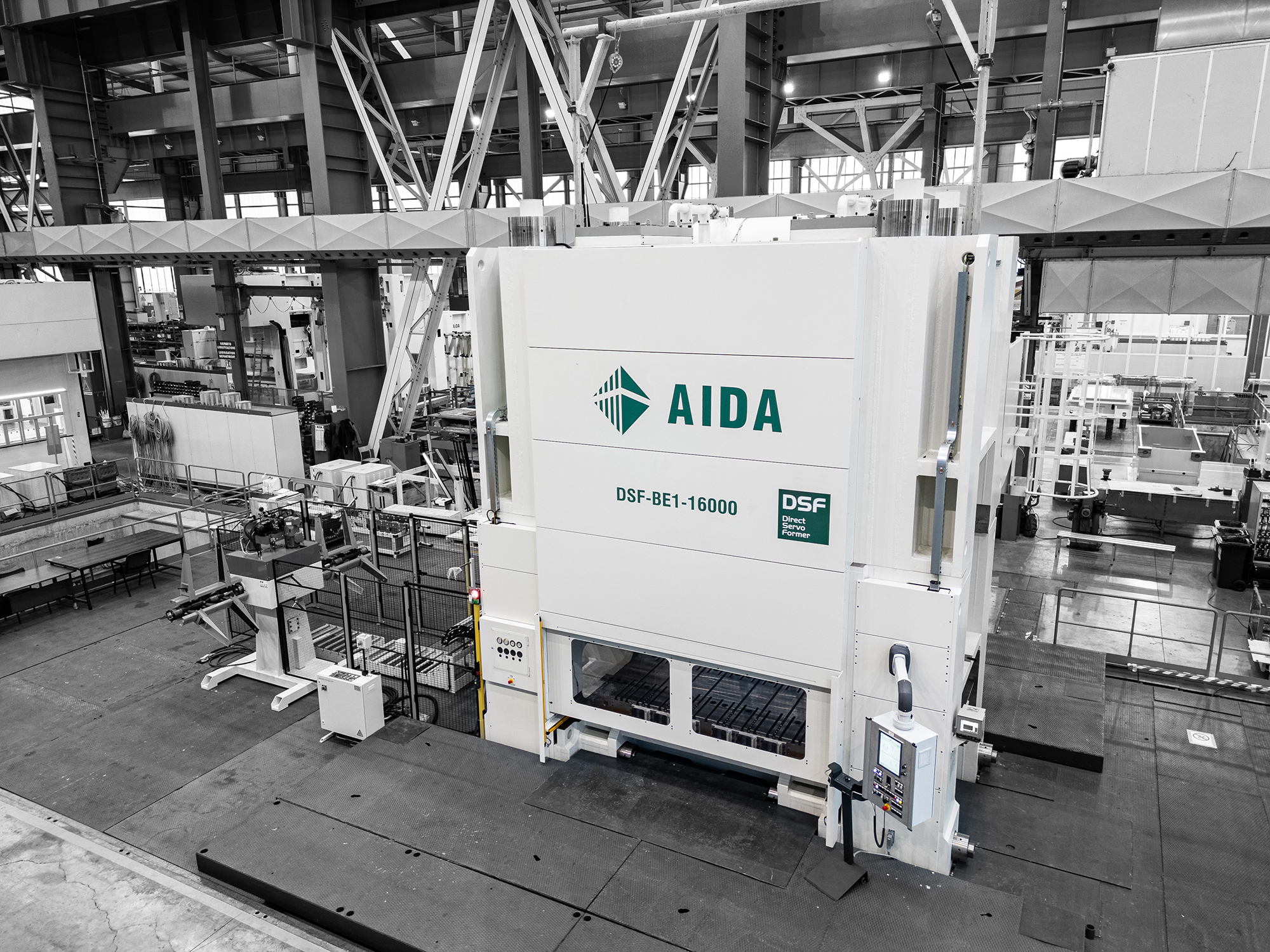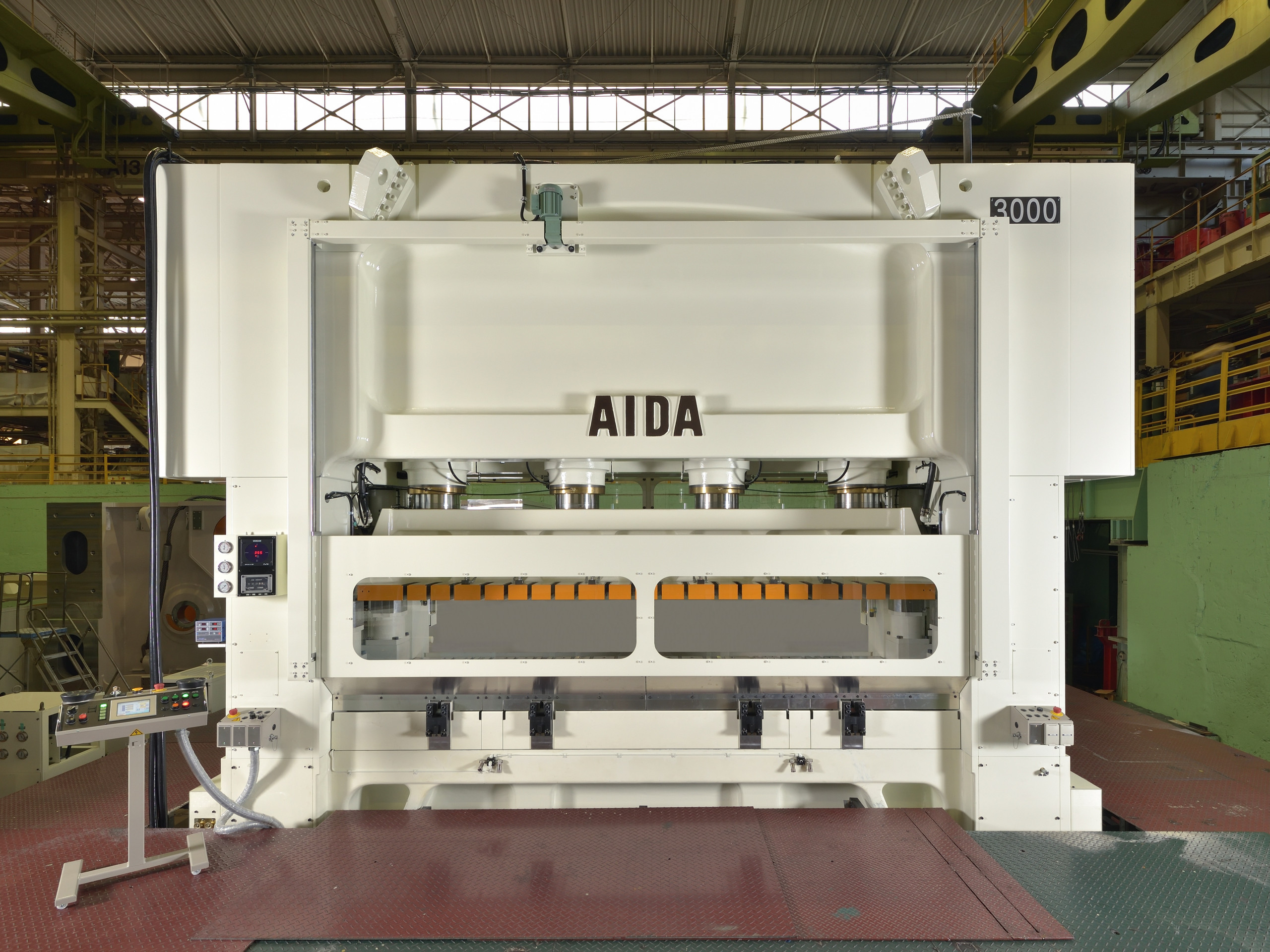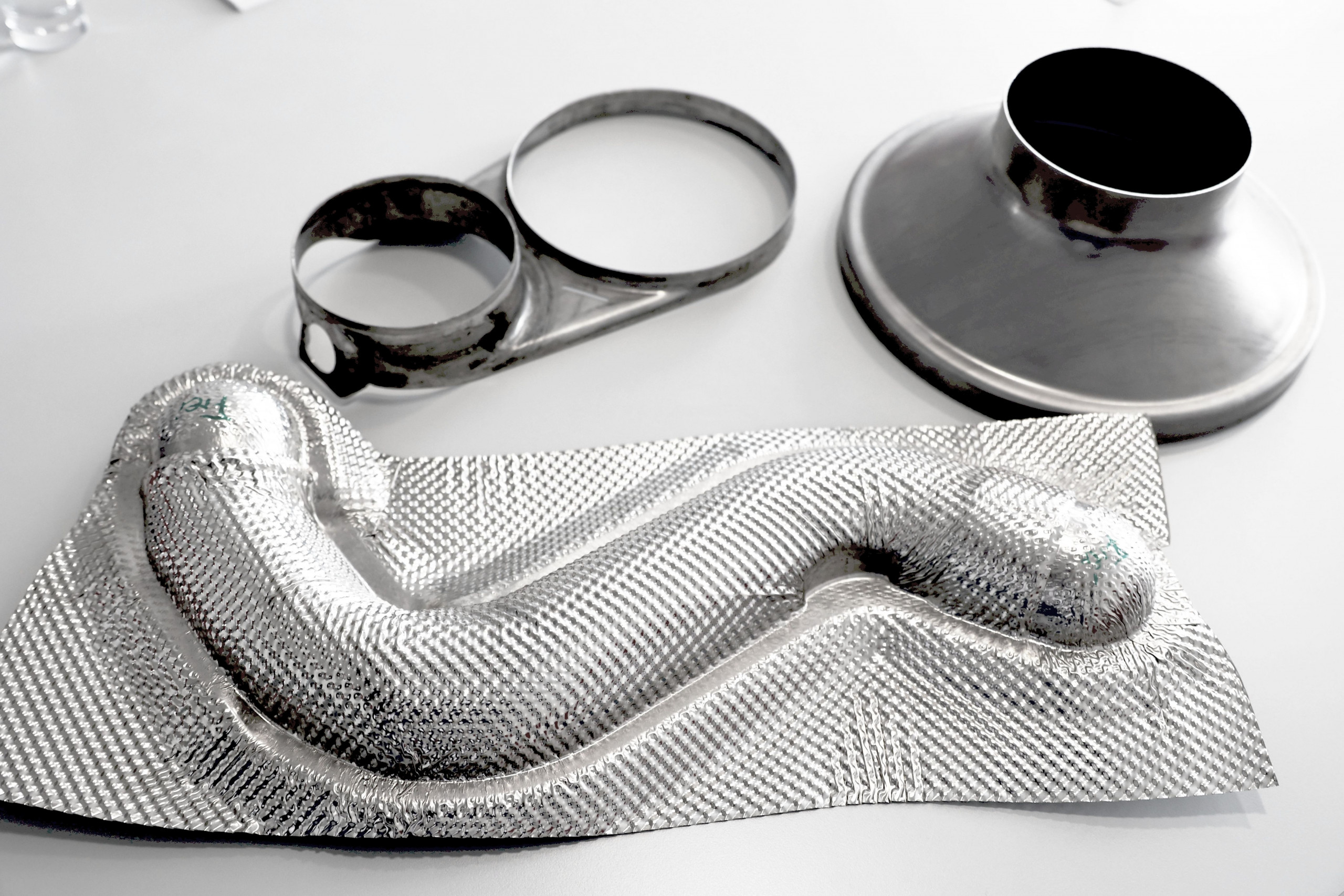
Anyone who manufactures for the automotive sector needs highly productive, reliable manufacturing solutions. Those responsible at BK Stanz- und Umformtechnik in Theley have been using an Aida servo press with Millutensil peripherals for thinner sheets from 0.15 to 2.5 mm for six years. This year, a second, identically tailored plant started operation – and is already also well utilized.
Until a few years ago, BK Stanz- und Umformtechnik in Theley had only hydraulic presses. Here, stamped, deep-drawn, trimmed, raised and folded sheet metal parts are produced, in particular for OEMs and suppliers from the automotive industry, both on transfer tools and with progressive dies. The tools for this are made in Berthold Kunrath’s own tool shop.
Until a few years ago, sheets with a material thickness of 0.3 to 5.0 mm in steel or 0.3 to 2.5 mm in stainless steel were classically processed. The specialists focus on complex drawn, stamped and bent parts. The size of the tools was limited to around 3600 mm until about eight years ago. Meanwhile, the trend on the market has been toward increasingly complex parts for years – at some point, however, the existing presses reached their limits in terms of manageable die size.
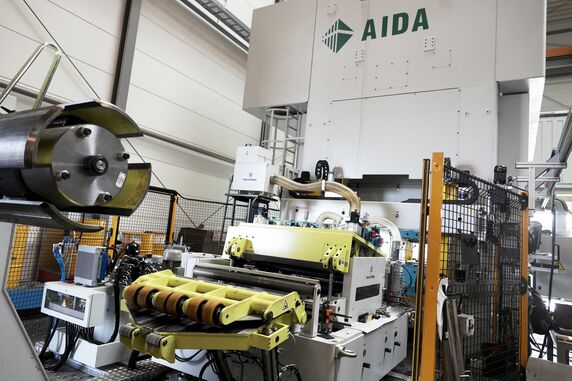
© Pergler Media
Future-proof realignment as a challenge
“Eight years ago, we were faced with the challenge of realigning our company to make it fit for the future,” explains Managing Director Thomas Schumacher. “We wanted to significantly expand our possibilities in the direction of larger quantities and also longer dies. It was thus clear to us that we had to expand our considerations beyond the area of hydraulic presses.”
The innovative company employs 48 people in toolmaking at Berthold Kunrath, and in BK Stanz- und Umformtechnik 36 employees produce parts on the presses, sometimes in several shifts. The machinery consisted of seven hydraulic presses and two eccentric presses. The existing range of workpieces was to be increasingly joined by workpieces made of thinner sheets with thicknesses of 0.15 to 2.5 mm.
Expanded workpiece spectrum opens up new opportunities
“We didn’t have such workpieces in our program before – but we wanted to implement this due to requests from our customers,” Schumacher recalls. “The new press should also be able to cover this. Based on our contacts in the industry, we were sure that we could utilize an appropriate press economically.”
The fact that such a system runs smoothly and can reliably deliver the desired quality is an important prerequisite – after all, the clients from the automotive industry have no understanding for any delays in delivery. Therefore, in addition to the plant and its peripherals themselves, reliable, fast and competent service was also an important criterion for those responsible.
Those responsible have looked around the market very thoroughly, investigating both mechanical and servo-driven presses and comparing the production concepts of a wide range of manufacturers. In the end, the Italian manufacturer Aida, which produces in Lombardy, clearly had the best values with a servo press and the customized peripherals from Millutensil.
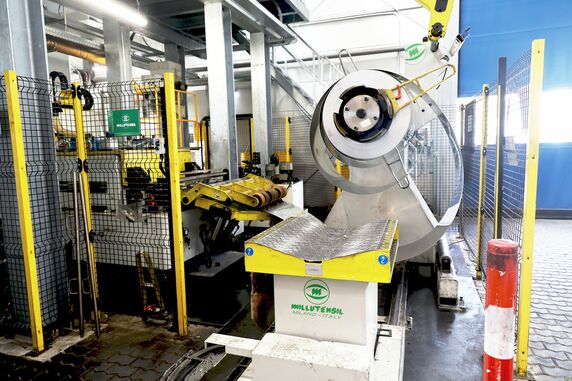
© Pergler Media
Servo presses ensure a leap in productivity
“Servo presses have major advantages over hydraulic systems, especially when it comes to high volumes,” explains Schumacher. “While hydraulic presses can be operated sensibly at between one and ten strokes/min in the part sizes relevant to us, one to 30 strokes are possible with servo presses. For our parts spectrum of highly complex stainless steel parts for the automotive sector, this marks a huge leap in productivity.”
However, at this speed, the press periphery must also be able to keep up – from the decoiler for the sheet coil to the straightening machine and oiling system to the safe parts removal and reliable disposal of the punching waste. Here, the fine tuning and synchronization of all elements in the line are indispensable prerequisites for smooth production later on.
The new press was intended to open up new customers for the sheet metal forming specialists and pave the way for the production of new families of workpieces. On the other hand, high cost pressure, particularly in the automotive industry, is forcing companies to optimize their production processes and make them more efficient.
Reliable overall system with high process stability
Thus, in 2016, Aida’s first servo press with a table size of 4000 x 1500 mm, a nominal force of 8000 kN and two hydraulic drawing cushions came to the company. The periphery for workpiece handling, from the decoiler for the sheet metal coil to the straightening machine and oiling system to the customized part removal via a finished part conveyor, comes from Millutensil. The same applies to the entire handling and disposal of the waste sheets, which the Millutensil systems reliably remove from the cutting zone and transport via the press basement by conveyor system with swiveling gooseneck into the containers provided.
At BK Stanz- und Umformtechnik, the typical run for a workpiece through the transfer die usually begins with the blank being cut from the sheet metal strip. In the second station, the part is first deep-drawn. The third station is for looking up the contours. In the fourth station, the workpiece is then trimmed. And the fifth and last station separates and separates the part – or several workpieces produced in one operation.
“A well-coordinated system of die, press and peripherals is a very efficient, process-reliable and process-stable production solution in our company” emphasizes Schumacher. “However, this presupposes that the press manufacturer, the periphery supplier and we as the user design the system accordingly in advance. Because if the individual components are optimally matched to each other and to the intended use, then great potential can be tapped.”
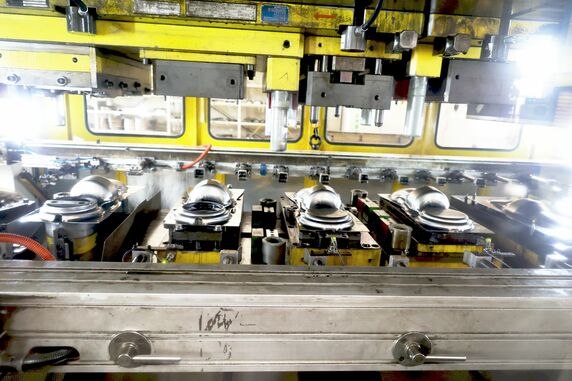
© Pergler Media
Listen to the user and implement suggestions
Schumacher has had very good experience here with Aida and Millutensil. “They listen,” he emphasizes. “And unfortunately, that’s not something that can be taken for granted.” With a high degree of flexibility, technical excellence and, above all, the unconditional will to create an optimum solution for the user, the experts from the two Italian companies approached the project together with the users at BK Stanz- und Umformtechnik.
“We felt comfortable with the companies right from the start,” Schumacher emphasizes. “At both Aida and Millutensil, responsibility is in the hands of women with a high level of technical expertise and a pronounced solution orientation. For example, the oiling system was naturally optimally matched to the oil we use. Just one of many details. In addition, the service staff at both Aida and Millutensil speak German. For us, this is a great advantage that makes many things easier.”
Smooth commissioning with competent service
The commissioning itself ultimately went smoothly, thanks in part to the dedication of the Aida and Millutensil fitters. When, for example, certain waste sheets repeatedly became jammed in the gooseneck of the waste sheet disposal system and required manual intervention, the management at Millutensil decided to enlarge the enclosure of the corresponding conveyor belts at no cost to the user and thus effectively prevent jamming. Quickly and easily, the few obstacles to optimal production were thus removed.
The very transparent commissioning schedule was met accurately. “We never had any doubts about that either – what we had seen at Aida and Millutensil inspired confidence,” Schumacher explains. “We had been shown everything, with an openness that is exemplary.”
Operator training ran in parallel with installation
Parallel to the installation of the press and peripherals, the specialists trained the future press operators on the new equipment and showed useful details for everyday work. For example, the operator also has a quick overview of critical points in the waste sheet transport via cameras – both in the press cellar and on the gooseneck above the container.
In this way, problems can be rectified quickly and easily as they arise. In addition to ease of operation, this also increases work safety and process stability, among other things. In addition, the specialists of both companies accompanied the production during the first 14 days. Even later – for example, if the operator had made a mistake and was at a loss – the service contacts were always available, for example by phone. “That makes a lot of things easier,” Schumacher knows. “Since then, we’ve always had that assurance that we could produce reliably.”
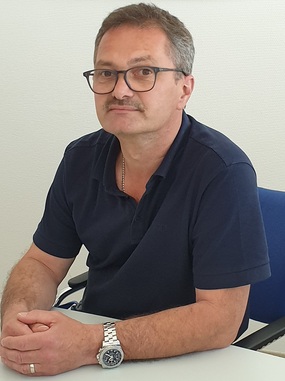
© BK Stamping and Forming Technology
Even the first production tool takes full advantage of the new size
Although the acceptance test was still running on an existing die, the sheet metal experts then went straight into the thick of things: “We went onto the press with a new 4-meter die that fully exploited the dimensions of the table,” recalls Schumacher. “For us, that opened the door to a whole new class of parts.”
In the first year, the system ran on a single shift. But soon the press was producing in two shifts, and sometime after a year and a half the third shift was also occupied, and eventually the Saarlanders were running 21 shifts a week – a clear signal to Schumacher that capacity had to be expanded again. Not only to be able to produce more parts, but also as a backup.
Proven combination for reliable production
“The system of Aida press and Millutensil peripherals had proved its worth,” emphasizes the managing director. “The press and peripherals are easy and safe to operate. Production runs reliably and very precisely, and there have been no breakdowns. It was therefore obvious for us to install the same system a second time.”
No sooner said than done. This year, Schumacher was able to start up the second Aida servo press with an environment made of Millutensil. “And although the systems are identical in principle, there have been noticeable changes again in recent years, both in the press and in the peripherals,” he assures. “The overall system runs even faster and more precisely – like clockwork. The systems communicate smoothly with each other – for example, start-up also works optimally.
For extensions Aida and Millutensil are set
Today, the production machinery is geared towards parts created with progressive and transfer dies – thanks to the now two Aida presses now up to a die length of 4000 mm. “And it’s clear to us that if we expand further in this area, it will probably be another Aida servo press. And if it’s a system with a coil line or feeder, then Millutensil is set for us,” Schumacher sums up. “In dealing with suppliers, I have had to recognize that there are many who are looking for problems. It’s different with Aida and Millutensil. They find solutions. And they implement them.”


